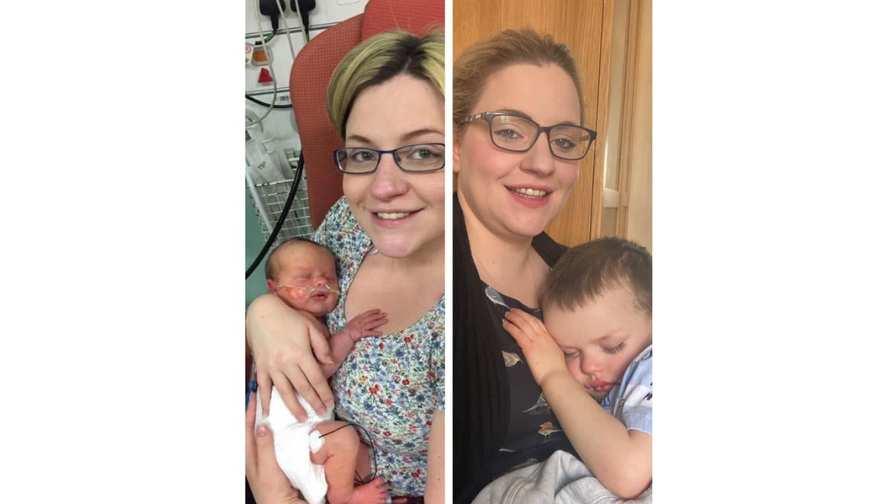Six-year-old George has had a feeding tube for most of his young life due to a rare condition, lung surfactant deficiency, which causes breathing problems.
When has was born, George was diagnosed with lung surfactant deficiency, a rare condition that causes breathing problems due to faults in the ABCA3 gene. George’s health has improved but his feeding tube, which he has had since birth, was only removed after his sixth birthday. There are no licensed treatments for ABCA3-deficiency and without a lung transplant, less than one in five children will live to celebrate their fifth birthday.[i] Children’s charity Action Medical Research and self-funded not-for-profit, LifeArc, are funding research into gene therapy for babies with lung surfactant deficiency caused by faults in the ABCA3 gene.
George’s mum Rame comments: “When George was born we were told to prepare for the worst and started planning for this. To hear that your son is not ‘compatible with life’ is every parent’s worst nightmare. We had George christened whilst he was hooked up to a ventilator, but fortunately, he started to improve and was weaned down on to oxygen. George is six now and is full of energy, life, has an infectious smile and is a total chatterbox. He had his feeding tube taken out earlier this year and is on high calorie oral supplements as he uses more energy than he takes in. This is the first time he’s been tube free since birth. I sobbed for hours as this was a huge moment for the whole family.”

Lung surfactant is a complex mixture of fats and proteins that lines the lung tissue and makes breathing easy.[i] Without normal surfactant, the lungs can collapse, leading to life-threatening breathing difficulties.2 Research has identified faults in several genes that can cause lung surfactant deficiency, including ABCA3, which provides the instructions for making a protein involved in surfactant production. Faults in this gene can cause life-threatening breathing difficulties in newborn babies.
Professor Deborah Gill, University of Oxford, says: “Our aim is to develop a new gene therapy for babies with severe breathing problems caused by faults in the ABCA3 gene by using a harmless virus to deliver a working copy of the ABCA3 gene into the baby’s lung cells. By enabling babies to make normal lung surfactant, this treatment should help them to breathe without mechanical ventilation.”
The team will carry out laboratory experiments to test the effectiveness of delivering a working copy of the ABCA3 gene into lung cells using a viral vector, viruses which have been modified so that they are harmless to the recipient but can transport genes into target cells. The hope is that these experiments will demonstrate that replacing the faulty gene will enable babies to make their own lung surfactant, which should help them to breathe independently without the need for ventilation.
George’s health has improved and his parents have had to become ‘experts’ in understanding lung surfactant deficiency. George attends mainstream school and is coping well despite having regular hospital appointments, physiotherapy, and visits from the community nurse.
Rame explains why she is supporting Action Medical Research’s Christmas appeal to raise £100,000 to support research that aims to develop a vital new gene therapy treatment for lung surfactant deficiency: “Although George isn’t hooked up to oxygen every day anymore, planning in life is still a huge challenge when you’re living with a rare condition like ABCA3. We can’t just pack our bags and go on holiday. We still need oxygen to fly and that comes with its own challenges. George’s older sister Holly copes really well. We rely on her for help sometimes, but she is always smiling. Life is challenging but we cope as we have no choice but to get on with it.”
Dr Catriona Crombie, Head of Rare Disease at LifeArc, says: “We’re committed to helping ensure new discoveries reach people living with rare diseases more quickly. We’ve been co-funding projects with Action Medical Research since 2019 and seeing projects like this move forward with the potential to help children like George, is really rewarding. Gene therapy holds promise for treating a number of rare diseases and we want to help make sure more treatments like this make it to the people who need them, which is why we also co-fund the Innovation Hubs for Gene Therapy with the Medical Research Council.”
For more about Action Medical Research’s Christmas Appeal, please visit: www.action.org.uk/george.
References
[1] Kröner, C. et al. Lung disease caused by ABCA3 mutations. Thorax 2017; 72(3):213-220.
[2] Medline Plus. Surfactant dysfunction. Available at: Surfactant dysfunction: MedlinePlus Genetics. Accessed November 2023.
